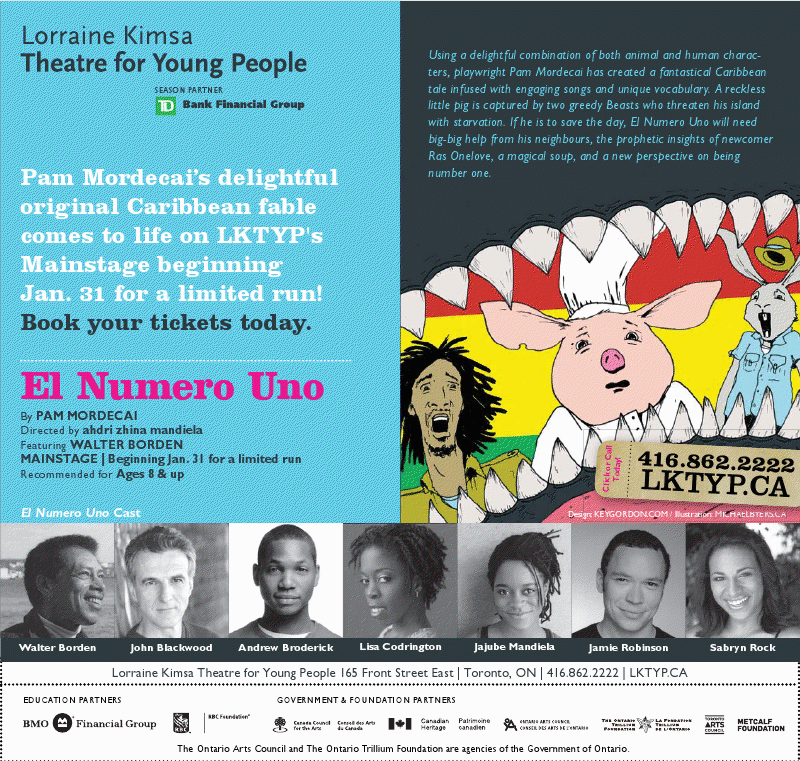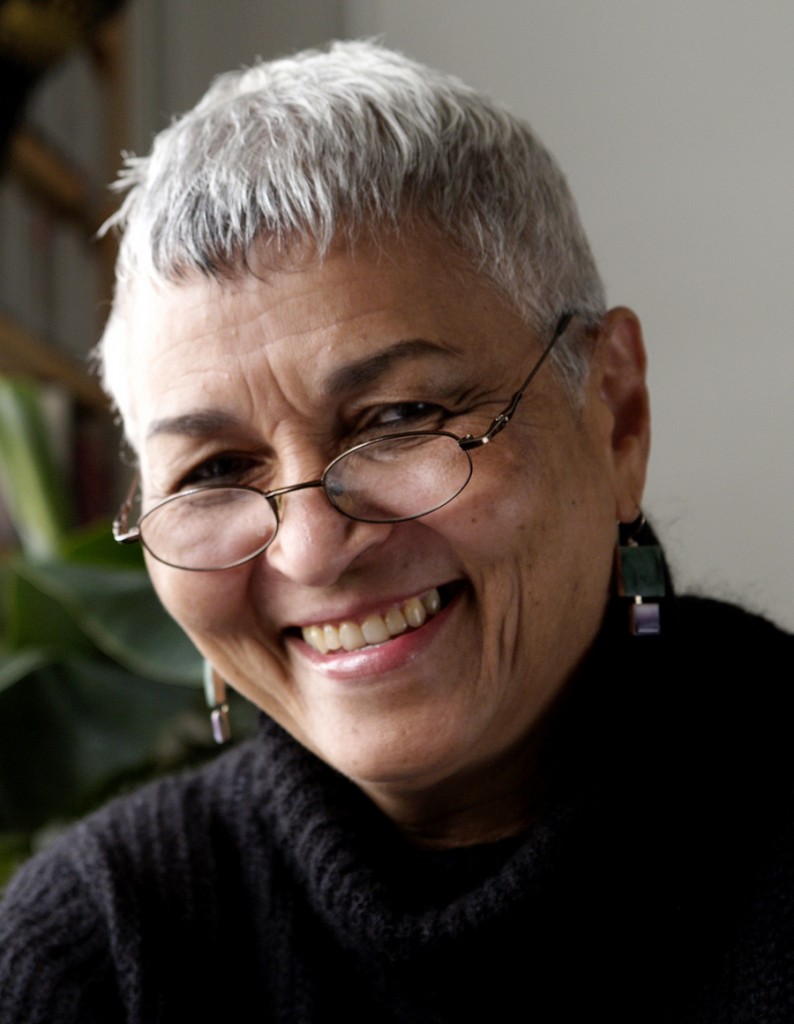YardEdge Talks to Pamela Mordecai About Her Upcoming Play “El Numero Uno”

YardEdge talks to Jamaican writer and poet, Pamela Mordecai about her work and upcoming play, El Numero Uno which opens in Toronto on January 31. The play was directed by ahdri zhina mandiela, a Jamaican born, Toronto based dub poet and theatre producer.
YE: Why are you a writer?
Pamela: It’s one way to earn a living.
YE: When did you first realize that you wanted to become one?
Pamela: I never had that kind of epiphany. I sort of fell into it and it’s been good to me from the start. I’ve earned a pretty good living from writing for the last twenty-five years.
YE: How would you describe your work?
Pamela: Hard!
YE: Tell us about El Numero Uno (What is it about? What was its inspiration? Is it a Caribbean story?)
Pamela: …from ad copy: “a fantastical Caribbean tale infused with engaging songs and unique vocabulary. A reckless [teenage] pig is captured by two greedy Beasts who threaten his island with starvation. If he is to save the day, El Numero Uno will need big-big help from his neighbours, the prophetic insights of newcomer Ras Onelove, a magical soup, and a new perspective on being number one.”
…from my blog post of 9 December: “…first hatched for the 25th IBBY Conference, held in Groningen, Netherlands, in August 1995. Dutch author and illustrator, Max Velthuijs, created a series of illustrations and four storytellers from various parts of the world were invited to create tales to go along with Max’s images. These were projected on screen when the stories were being told to the audience at the conference. Thus was El Numero Uno, aka Le Premier Cochon, aka the Number One Pig, born.”
YE: Have you written and staged plays before? If yes, where and what play?
Pamela: I’d written two plays long ago – three, if you count my book of poetry, DE MAN: A PERFORMANCE POEM – which is a sort of verse play. The first two were called “The Birthday Party” and “The Office”. “The Birthday Party” was put on by my fellow Diploma in Education students in 1965 on the UWI campus. “The Office” was never staged. DE MAN has been performed numberless times. Next performance is this year in Calgary at Easter.
YE: What is your preferred format to write: poetry, short stories, plays? How do you compare the process of each?
Pamela: I don’t prefer any one rather than another. Characters speak to me and I find it easy to put their voices on the page. I hear children’s voices especially clearly. In a play, you create characters by what they say – and of course what they do – but what they say is important, so that calls on the same set of skills. And never mind that the shape of a poem seems very different from the shape of a novel, or short story, or play, they all have a shape. So you have to find that shape, create it. A novel is a special challenge, because it is long, but that’s perhaps a matter of stamina. Rhyme, rhythm, word play, tone of voice and humour are all, important to me, whatever I’m writing.
YE: How have you developed your skill (s) as a writer?
Pamela: Mostly through reading, though I’ve done one or two short courses. I’ve also been part of a couple writing groups, and they are wonderfully supportive and helpful. And I have great people who read for me and comment on my work.
YE: What other writers have influenced you and how?
Pamela: One is influenced by everything one reads. My short stories have been compared to Flannery O’Connor’s, and I’d never have thought of her as an influence. But then I suppose we are both neurotic Catholic women. I did a bit of theatre in my youth, so Shakespeare was in my ears and my mouth from early on; I did a lot of reciting of poetry in school and was in love with the Romantics as an adolescent; I’ve been a lifelong fan of Louise Bennett’s and know Brathwaite’s and Walcott’s poetry well; and I loved the work of Samuel Selvon from I first encountered it. I think Vic Reid’s THE LEOPARD is a vastly underestimated book, and I like the toughness of Dennis Scott’s poetry and plays. But I don’t know that they’re influences any more than Georges Simenon’s Maigret tales or James Lee Burke’s detective stories.
YE: What inspires you to write?
Pamela: Almost anything.
YE: What kind of response/feedback/success have you received in your career so far?
Pamela: I’ve earned my living from writing. That’s been satisfying. Thousands of children on both sides of the Atlantic know my poems and stories. That’s satisfying too. Anything else is extras.
YE: What are your greatest challenges in your work?
Pamela: I’ve two great challenges: to find enough time and to promote the work.
YE: What are your greatest rewards?
Pamela: I’m happy when I write, so it’s its own reward. I enjoy reading my work and other people seem to enjoy hearing me read, so that’s also rewarding. To be published, well-reviewed, anthologized, taught and produced on stage is nice too, but those are extras. So I’ve had both rewards and extras.
YE: How have you handled the business side of being a writer?
Pamela: I clear my permissions, welcome my royalty cheques and do my income tax returns myself. I’m a small press publisher, so I know a bit about contracts and copyright. I’m registered with copyright clearing houses and public lending rights agencies in Canada and the UK. In the last few years, I’ve had an agent who handles some of my work. I can’t afford a publicist, unfortunately, and I do need one because I’m really bad at promoting my work.
YE: What advice would you give to young writers?
Pamela: Read and read and read; join a writing group.
YE: How do you compare living in Jamaica with living and working in Canada?
Pamela: I take it you mean as far as being a writer is concerned? Canada funds the arts through generous grants, and I’ve been lucky. One day I received two cheques in the mail that totaled thirty something thousand dollars, the proceeds of two grants that I’d applied for. I don’t think there’d be much chance of that happening in Jamaica – not in my lifetime.
YE: How would people who know you describe you?
Pamela: Very differently, I suspect.
YE: If you could be doing anything you wanted, what would that be?
Pamela: Singing in the heavenly choir.
YE: Plans for the future?
Pamela: To keep eating.
YE: What gets you up in the morning?
Pamela: Tell the truth, I’d rather not.
YE: Favourite book?
Pamela: The Bible.
YE: Why?
Pamela: Sex, violence and a Super-hero who saves the day.
YE: Any regrets?
Pamela: That I didn’t stay home with my children when they were growing up.
YE: Tell us a secret?
Pamela: Then it wouldn’t be a secret any more.
YE: Final thoughts?
Pamela: W. H. Auden said, “In the end, art is small beer. The really serious things in life are earning one’s living and loving one’s neighbour.” Subcomandante Marcos said, “In our family, words had a special value. Our way of approaching the world was through language… One way or another, we became conscious of language, not as a way of communicating, but of constructing something.”
You can contact Pamela via email at pammordecai [at] gmail [dot] com.
Also check out Pamela’s blog, website and Pink Icing and Other Stories



5 Comments
[…] The last time we spoke to you, in January 2010, it was about your play, El Numero Uno which was having its world premiere in Toronto. Have you given up on writing […]
[…] also YardEdge interview YardEdge talks to Pamela Mordecai about her upcoming play El Numbero Uno Pamela Mordecai Tweet This […]
Congrats to Pam on this play. She is good allround but great for Children. I wont get to see it but have sent the notice to my granddaughter in Ontario. And who knows someday here…
I imagine el Numero Uno is cousin to the Big Pig of Pig Poem which is one of my favourite and most used poems
[…] For full interview, see http://www.yardedge.net/drama/yardedge-talks-to-pamela-mordecai-about-her-upcoming-play-el-numero-un… […]
Very nice interview with Pam. Hope I can get to see the play which sounds really interesting & will run for Black History Month in Toronto. Hope someone will produce it here in JA.